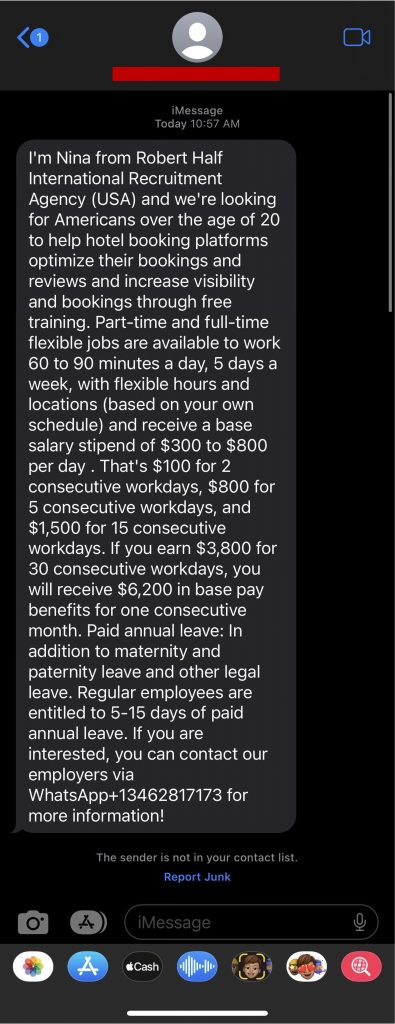This week we’ve found phishing attempts in which scammers are impersonating Robert Half International, iCloud, and AT&T. Would you have been able to spot these scams?
Robert Half International Recruitment Scam
People rely on the internet a lot when job hunting, but do you know how to apply for jobs online safely? This week lots of people have received job offers via text/WhatsApp from scammers wrongfully impersonating Robert Half International, the 100% legitimate human resource consulting firm based in California:

The offer says you can earn up to $800 a day with lots of other benefits, and then it prompts you to contact the company via WhatsApp for more information – this definitely sounds too good to be true! If you proceed, you might be asked to wire money or even provide your personal information.
In fact, such fake Robert Half job opportunities have been around for a while. Back in 2023, Elaine Lam, their Managing Director, published a notice on LinkedIn warning the public:
“Robert Half would like to alert you to an impersonation scam involving individuals pretending to be Robert Half employees. Some individuals have informed us that they received local or overseas WhatsApp or Telegram Texts with the texters claiming to be Robert Half employees with potential job opportunities.”
She also stressed that applicants should be careful about the source of the offers:
“All our job listings are available on the Robert Half website, with our Company EA License number published. Do verify the job openings mentioned by the sender against those listed on our website if you have any doubts.”
Here’s a list of more red flags of such suspicious job offers. For more tips on avoiding online job scams, check out this article:
- There is no official interview; everything is done through online messaging services.
- They might ask you to pay an advance fee to secure the job, to buy office equipment, or for “start-up packages,” or other suspicious requests.
- They might want you to submit sensitive personal information, including your Social Security Number or even bank account number, through some online form.
Protect Yourself from Scams
The truth is, there are lots of scams and scam sites on the internet and they’re getting even more difficult to detect with common sense alone. However, for an easy and reliable method of detecting and avoiding scam sites, check out ScamCheck
ScamCheck can shield you from scams, fake and malware-infected websites, dangerous emails, phishing links, and lots more! If you come across something dangerous online, you’ll be alerted in real time so you’ll know to stay well clear.
Phishing Attempts
Besides online job scams, scammers also use phishing scams to trick people. Posing as trusted brands they lure you into clicking on malicious links that lead to phishing pages where they can record all your PII, such as your Social Security number, login credentials, and credit card details. They can thus steal even more from you, including your money and even your identity!
iCloud Storage Scam
We’ve been tracking fake iCloud storage warning texts for weeks. Threatening that you will lose all your files if you don’t take action, scammers want you to click on the attached phishing links. For example, in the past 7 days, we’ve blocked this 2,458 times:
- YOUR CLOUD IS FULL! All files will be deleted if you dont react soon. You, As a loyal customer gets 00GB extra for FREE <URL>
The link leads to a fake iCloud login page. If you proceed and log in, scammers can gain access to your account and thus be able to make purchases using your stored credit card details, or even access your private data. Be careful!
AT&T Giveaway Scam
“Take a survey and win AT&T credits!” If you receive a text saying you’ve won a free gift from some giveaway campaign that claims to be from AT&T, please don’t click on anything. It is a SCAM!
- Turn 0 min Survey into <MONEY>OOO AT&T Credits <URL>
- AT&T Giveaway Winner Line: <PHONE> Color: Titanium Storage: 000GB <URL>
The attached link will take you to a fake AT&T online survey page that promises you rewards and asks you to fill out the survey; however, you could end up exposing personal info such as your credit card details. Don’t let that happen!
Tips to Stay Safe Online
- Double-check the sender’s mobile number and email address. Even if it seems legitimate, think twice before you take any action.
- Reach out to the company’s customer service directly for help and support.
- Never click on dubious links or attachments! Stick to official websites and apps.
- If you’ve accidentally revealed your PII somewhere, change your passwords immediately and inform your bank and/or other companies that scammers may contact them pretending to be you.
If you’ve found this article an interesting and/or helpful read, please do SHARE it with friends and family to help keep the online community secure and protected. Also, please consider leaving a comment or LIKE below.

